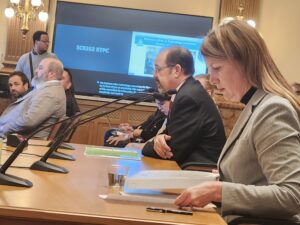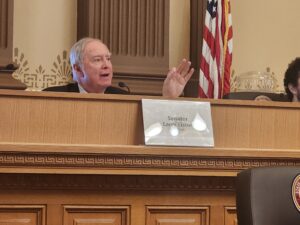Senate Democrats used their first bill session of the 2025 legislative session Tuesday to advance a major proposed change to the state’s Labor Peace Act, saying the 82-year-old “compromise” law isn’t working more for Colorado employees.
The 4-3, party-line vote by the Senate Business, Labor and Technology Committee to send Senate Bill 5 to the Appropriations Committee came despite warnings from business that erosion of the law would further reduce the state’s declining economic competitiveness . But one of her supporters said she would like to see business and labor leaders find a compromise – a plea issued before the sides head to a major negotiating session on Wednesday.
SB 5, sponsored by Senate Majority Leader Robert Rodriguez of Denver and Democratic Sen. Jessie Danielson of Wheat Ridge, would end the eight-decade requirement that workers pass two votes on the union press. The first vote, to organize a workplace, requires majority support, while a second vote of 75% is needed for a union to begin negotiations with an employer to collect dues from the paychecks of every employee, even non-members. unions, which can be. used for bargaining and negotiation.
What would the amendment to the Labor Peace Act do?
The second election — a unique feature that sets Colorado apart from the 26 right-to-work states and 23 right-to-organize states — is considered a compromise by business leaders, but SB 5 supporters saw it as on Tuesday as an unnecessary and unfair burden. . Danielson called that a key reason Colorado’s 6.9% unionization of private-sector workers is the lowest non-right-to-work rate of any state, and labor leaders said it gives employers time to bully workers into vote against mandatory fees known as union security.
Banning runoffs and allowing the union to negotiate wages immediately will fund bargaining that results in higher wages and benefits and less of an income gap between workers and management, said Colorado Fiscal Institute labor policy analyst Sophie Mariam. It would also increase workplace safety and give disenfranchised workers more voice, SB 5 supporters said.
“Powerful business interests have ironically suggested that this bill would raise costs for working people. Nothing could be further from the truth. The most powerful driver of rising costs is corporate greed,” said David Seligman, an attorney for Justice. “(Second elections) are not about protecting workers’ choice. It is about diminishing the freedom of workers to access union security.”
Attorney David Seligman testifies Tuesday in favor of proposed changes to the Labor Peace Act.
Business leaders – as well as some workers in the restaurant industry – strongly disagreed, saying the 75% bar is meant to ensure that workers who don’t want to pay dues to a union they didn’t want to join, they are not required to do so. Sean Connelly, a franchisee who owns six McDonald’s restaurants in the state, said the mandatory fees would be a burden on workers and would directly infringe on the rights of his employees if they paid into a union.
Pushback from employers
At a time when Colorado’s economic competitiveness is declining — a study commissioned by the Colorado Chamber of Commerce found it is the sixth most regulated state — the Peace of Labor Act helps the ability to attract employers, economic development leaders said. Potentially displaced employers “almost always” ask about the law and view it favorably, said Jeff Thormodsgaard, vice president of government affairs for the Colorado Springs Chamber & EDC.
While labor leaders said SB 5 would lead to higher wages — Mariam pegged the increase at $2,500 per worker, or $5.7 billion statewide — opponents argued those costs would be difficult for businesses to afford. at a time of inflation and shrinking profit margins. When GOP Sen. Lisa Frizell of Castle Rock asked what workers could earn more, Common Sense Institute senior economist Thomas Young pointed out that Colorado already has the eighth-highest wages and 13th-the highest benefits in the country and said further increases would further increase the cost of living.
Colorado Chamber President/CEO Loren Furman pointed to a recent poll showing 64% favorable union opinion, but also 70% opposition to SB 5, and argued that there is room for compromise that the bill’s supporters are not discussing now. Yet the passage of SB 5 — even after groups like it worked with workers to kill past efforts to make Colorado a fair-to-work state where no one can be forced to pay union dues even in organized workplaces — it will ignite a firestorm and distract. from other issues, she warned.
“There may be structural changes that can be made. But we remain absolutely committed to giving workers a voice,” Furman said, noting that business leaders are willing to negotiate, but not on the issue of getting rid of runoffs. “It makes perfect sense to us. that we continue to work toward a solution instead of creating a fight in this building or on the ballot.”
Sponsor has “problem” with arguments

Sponsoring Sens. Robert Rodriguez and Jessie Danielson explain Senate Bill 5 before a committee Tuesday.
Senators did not mince words about the proposal, adding to the perception that the ferocity of the debate over the issue could seep into general legislative relations and affect other bills this session.
Rodriguez said the issue depends on who gets money from their work – the employees or the already wealthy owners of a company. He brushed aside claims that the Labor Peace Act is one of Colorado’s best tools to attract jobs right now and said lawmakers should be thinking more about the workers who struggle to make ends meet here.
“If there are entities that want to come here because we have the ability to discourage organizing by workers, that’s a problem for me,” Rodriguez said. “I am not against business. I believe in people who make a dollar. And I also believe that you are only as strong as the people who work for you.”
Room for compromise?

Colorado state Sen. Larry Liston speaks during a committee hearing on Senate Bill 5 on Tuesday.
But Sen. Larry Liston, R-Colorado Springs, countered that Colorado is changing for the worse because of regulations and costs, and he predicted that if SB 5 becomes law, it will accelerate the state’s current economic decline.
“If the Labor Peace Act is withdrawn, I have a real sense that there will be a lot of companies that will say, ‘Goodbye, Colorado, we won’t even consider you,'” Liston said before voting against. bill. “It may not be perfect. But I think if we get rid of the Labor Peace act, I think we’re going to ruin the day.”
The only lawmaker who seemed interested in compromise was Sen. Nick Hinrichsen, a Democrat from Pueblo, who asked several witnesses if it might be possible to change the way union elections are conducted to make it easier to organize without disrupting voting. the second. He seemed interested in the idea of holding the first vote to form a union with simple majority support – as dictated by the National Labor Relations Board – but requiring a higher percentage of 60% or more in that vote to approve union security.
In the end, Hinrichsen voted to advance the bill, saying the current system encourages free uploading by non-fee-paying members if they can join on the first ballot but aren’t willing to fund the work they’re then required to do. make a union in representing them. But he added that he wants the negotiations to continue.